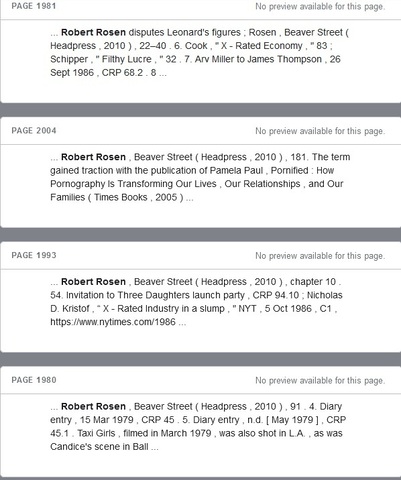
Beaver Street is cited in Candida Royalle and the Sexual Revolution: A History from Below, by Jane Kamensky.
More than a dozen academic books have cited Beaver Street: A History of Modern Pornography as a source of information. They have titles like Desire and Consent in Representations of Adolescent Sexuality With Adults; Digital Gender Sexual Violations; and Revenge Pornography: Gender, Sexuality and Motivations. Unless you've taken a college-level porn studies course, I doubt you've heard of any of them, and even if you've come across such a book, it's unlikely you've read it. They're filled with academic jargon and are almost unreadable.
Historian Jane Kamensky, a former Harvard professor, recently published a book about the porn industry that, unlike its academic predecessors, is written for a mainstream audience and has been getting some high-profile media attention. Candida Royalle and the Sexual Revolution: A History from Below cites Beaver Street four times.
Royalle (real name Candice Vadala), who died in 2015 at the age of 64, was a porn star who became a producer of X-rated videos that explored women's fantasies.
I was curious what information Kamensky had gleaned from my book. So I checked out Candida Royalle's extensive notes, practically a book in itself, and was impressed with the enormous amount of research Kamensky did.
Though Beaver Street doesn't mention Royalle—I never dealt with her during my tenure as an editor of "adult" magazines—I did write extensively about other people and topics Kamensky explores: the late Gloria Leonard, who was the figurehead publisher of High Society magazine and a member of Royalle's porn star support group; Traci Lords, the underage sex superstar who disrupted the porn industry; male and female porn stars in general; and the nitty-gritty of porn technology and economics. One of Kamensky's Beaver Street notes has to do with Lords and another concerns porn technology and economics.
The Leonard note calls for closer examination. In Beaver Street I wrote that High Society's circulation was 400,000. This is accurate information based on what I learned during my time working at the magazine with Leonard in 1983 and '84. In Candida Royalle, Kamensky quotes Leonard as saying that circulation was four million. This is absurd—she added a zero to the true number. If it were true, it would have meant High Society sold more copies than Hustler and was running close behind Penthouse and Playboy. The whole time I was there, the real publisher, Carl Ruderman, was obsessed with catching up to Hustler, his personal white whale that would brand him "Asshole of the Month" in November 1983. In her note Kamensky writes, "Rosen disputes Leonard's figures."
This is correct. I here and now dispute with great vigor Leonard's fantasyland PR hype that nobody with any sense ever believed.
The most interesting footnote is for a quote Kamensky uses in Chapter 22, "Pornography of the People." Izzy Singer (real name Neil Wexler) is one of the main characters in Beaver Street. He's an intellectual pornographer and my porn industry mentor. Kamensky writes: "For male performers, orgasmic reliability was the gold standard, and could insure a lifetime of work for those with the homeliest faces. But for women, ripeness was all, and in the heat of the triple-X theater, ripeness quickly sugared into rot. The publisher of For Adults Only magazine put it bluntly: 'The sad fact is that porn stars age in dog years.'" In footnote 53, Kamensky identifies the source of this wisdom as "Izzy Smith."
The dog years quote comes from Beaver Street, page 91, and Kamensky got it almost right—it's "sad part" not "sad fact." And she got the pseudonym, Izzy Singer, half right. (Wexler was the editor, not the publisher, of For Adults Only.) But she must be given credit for recognizing Wexler's profound insight, one that in my non-academic opinion deserves a place of pride in Bartlett's Familiar Quotations.
_______
All my books are available on Amazon, all other online bookstores, and at your local brick-and-mortar bookstore.
I invite you to join me on Facebook or follow me on X or my eternally embryonic Instagram or my recently launched Threads.
